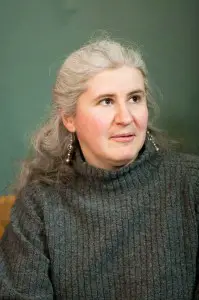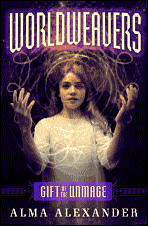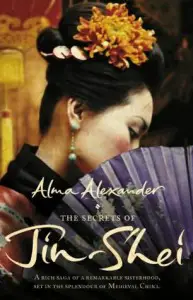 Alma Alexander is an American author of historical fiction and fantasy. She was born in 1963 in Novi Sad, Yugoslavia. She now lives and writes in northwestern United States. In this interview, Alma talks about her books, her love for fantasy, reading and writing.
Alma Alexander is an American author of historical fiction and fantasy. She was born in 1963 in Novi Sad, Yugoslavia. She now lives and writes in northwestern United States. In this interview, Alma talks about her books, her love for fantasy, reading and writing.
Voicu Mihnea Simandan: You have been a story writer for most of your life. How has your writing evolved over time?
Alma Alexander: Improved over the years, I hope – it has been said that any practitioner of a craft needs a learning curve, and that you probably have to write two million awful words before the first really good ones start coming through. That may differ for different writers, or for people starting from different starting points – those who have been nurtured in a lifelong love of reading and language already have a head-start on those who came to reading late, or reluctantly. I was lucky in that my house was always full of books, that there was no book that was ever forbidden to me (the rule was, if I could read it, if it entertained or interested me, it was okay) – I self-selected my reading levels, leaving the more “difficult” stuff until later, but by age 13 I was reading some high-level writers and I do believe that this has had an impact, however hard to measure, on my own words. I wrote my first full-length novel when I was younger than 11 – and it was AWFUL, it was derivative of all the things I’d been reading at that time, and it was a patchwork ‘homage’ to all the writers I aspired to be. My second novel, written at age 14, was already MUCH better than this… and completely original. I think the thing that evolves most over years of practicing the craft of writing is pretty much your voice as a writer – and you simply must allow time for that to mature before you have something worthwhile to say and share with the reading public.
VMS: The Secret of Jin-shei (2004), your saga set in medieval China, is a powerful story of a group women from different social classes. How much research did you do before you started writing this novel?
AA: Short answer: HEAPS. I have a double shelf of books relating to the history, philosophy, geography, anthropology, culture and literature of China. I was consciously not writing a book that was directly ABOUT Imperial China, but it owed everything to that country and that general era in the way that I build up my own country, my own world. The idea of research, as I see it, is to inform the imagination, rather than strangle it – which is why I like writing things with an fantastical edge, it gives me a little bit of wiggle room to tell a good story and not be constrained by “THIS happened THEN” with no way to work around it. In Jin Shei, for instance, one of the things that astonished and delighted me was the alchemy aspect of it – because what I knew about alchemy as a subject owed a lot to the Western ideas on the subject, but when I went to do a bit of research on it I discovered that there was an entire body of knowledge alchymical which was very much rooted in the Eastern and Oriental tradition, and this was wonderfully helpful with building my own version of it in my own world. I believe in research, in trying to be true to an idea, a time, a place. But it should not be a fetter. It should be an unfolding of wings, allowing you to fly over everything and see all things anew from a high vantage point up in the sky. You would be surprised how much good research can actually shape and drive a story.
 VMS: Where did the ideas for the Worldweavers young adult trilogy come from?
VMS: Where did the ideas for the Worldweavers young adult trilogy come from?
AA: The basic idea came to me when I wandered into a Young Adult panel at the World Fantasy convention in 2002 – at that time I had no intention of branching out into the YA field but the panel had a couple of great writers whom I admired (Jane Yolen, Charles de Lint) and so I went along anyway. This was back in 2002, back when YA seemed to consist of only one name – HARRY POTTER. And certainly it wasn’t long – less than ten minutes – before the first hand in the audience came up to bring a Harry Potter related comment. At which point Jane Yolen heaved a deep sigh and said, “I was wondering how long it would be before that particular elephant walked into the room.” And then said that she didn’t much like the way that the Harry Potter books treated their girls. And I lost the rest of the panel, because I was already in Thea Winthrop’s world.
My premise for my own books were that (1) I would have a heroine, not a hero – Harriet Potter, if you will – just to prove that yes, it was POSSIBLE for girls to have adventures too; (2) I would write the American book, as opposed to the English book. The Americans fell for Hogwarts like a ton of bricks because none of them have ever set foot in a good English Boarding School – I have, and I can tell you that the real fantasy in Harry Potter isn’t the magic, it’s the food that the kids eat in Hogwarts… but aside from this, it’s a cultural brick wall, in a sense, and all the magic (down to the Latinate spells) is very European and British. I wanted to write a book about the magic and the gods of the New World. I wanted an American heroine. And (3), last but not least, I started from not “the boy who lived”, the chosen one, but rather from “the girl who couldn’t” – someone who could (in a world that expected and demanded this) do no magic at all. She learns eventually that the world is not what she thought it was, and I am currently writing the fourth book in the Worldweavers series, in which much is finally explained. But I had a great deal of fun weaving the Native American mythology in these stories, and indeed having Nikola Tesla as one of my characters has been a delight.
VMS: But why fantasy?
AA: As I keep telling people, *ALL FICTION IS FANTASY* – by definition. It’s ALL lies. But some truths are best told when wrapped in a layer of sweetener, a layer of true fantasy and made-up-ness, and the lessons are learned without the student being aware that they were being taught. I believe fantasy – the accepted definition of it – plays a huge part in shaping our children’s minds, and hearts, and spirits, and ethics. I grew up on the world’s original savage fairy tales, and they taught me everything, they made me into who I am today. I can offer my own fantasy writing to the young readers of this world and hope that they get something as valuable out of that as I got out of my own immersion into fantasy when I was a child.
VMS: We were both born “on the banks of the Danube” so to speak. When NATO started bombing Yugoslavia in 1999, you took it upon yourself to let the world know “the truth” and, the same year, you published Letters from the Fire. More than a decade after these events, what is your current position on the breakup of Yugoslavia?
AA: It still hurts to look at a modern atlas and see the land of my birth dismembered into so many small and dysfunctional parts. The last time I was there, I went to the banks of my river and mourned the bridges that were gone, the bridges that spanned the river of my childhood, which my young nieces will now never know or remember. But in some ways that is only a metaphor, a symbol, and what I was mourning was the loss of something far bigger and probably irreplaceable. The loss of my grandfather’s unshakable ideals (“Europe will never let this happen!” he said, and believed it to the day he died – and I am just as glad that he never lived to see the legacy of what Europe not only permitted but encouraged to happen in the land that used to be known as Yugoslavia.); the loss of a state of mind; the loss of an idea sacrificed to the ambitions of outside empires who seized the chance to pursue their own interests in the region no matter what the costs on the ground were to the people who lived there.
 VMS: You have started as a non-fiction author but have moved on to write young adult books. How did you find the transition?
VMS: You have started as a non-fiction author but have moved on to write young adult books. How did you find the transition?
AA: Actually, I didn’t – I started as a poet – my first surviving “work” is a poem I wrote when I was five years old. And after that, I told stories. I did non-fiction work because it paid (articles, travel writing, book reviews, etc – and then the autobiographical Houses in Africa memoir) but that came later. First and foremost, always, I am a storyteller.
VMS: Some people believe that children no longer read and, with the availability of affordable e-readers, many believe that, sooner or later, children will no longer want to hold books in their hands. Please comment.
AA: I hope with every fiber of my being that there will never come a generation which has never held a Real Book ™ in their hands. Books, to me, have always been friends and companions. For all the convenience of the e-readers this is something that they can never EVER replicate for me.
VMS: You are very active online and maintain an excellent website and blog. How important is it for writers these days to be “out there” on the Internet, interacting with their fans?
AA: Actually I am of the firm opinion that it depends on the writer. If someone is comfortable and at ease in the blogging world, then that person will communicate this to the readers and it will be a pleasurable experience for both. Anyone who is doing blogging because they “think they have to” is really doing themselves a disservice. Writers existed before the Internet and although we are all very much more wired than we have ever been before it is still probably possible not to be an active blogger and have a successful publishing career. I do think that a web presence in the form a website (however rudimentary!) is probably a good idea, and preferably it’s a website that IS being updated with news and developments of your life and career on a regular basis, even if you don’t want to bare your bloggy soul out there for everyone to see. I welcome interactions with readers and fans, and I try to answer every email I get – and it’s, frankly, fantastic to get communications from readers in places as far apart as Germany, the Netherlands, Brazil, Canada, China. I love the idea that my books have found their way to all of these scattered corners of the world, and it’s thanks to the Internet that I can follow their travels…
VMS: Do you still read young adult fiction?
AA: I read EVERYTHING.
VMS: What book are you working on right now?
AA: A couple of YA projects, as it happens. The fourth book in the Worldweavers series is in process as we speak, and I am working on a brand-new YA trilogy which is currently at the stage of having book #1 teased into the best possible shape it can be before I find a home for it out there. More information on my website and my blog (you see, they ARE useful!) as things develop…
VMS: What is your writing routine?
AA: Honestly? None. Writing isn’t routine. Sometimes I can sit down at a computer keyboard and crank out 6000 words at a sitting. Other times “writing” involves sitting down with a research book and taking notes – or simply taking a long walk and THINKING about a problem that has cropped up in a current story. The only thing that I would say falls into a “writing routine” category, although that is more of a lifestyle choice, is lots and lots and LOTS of coffee (and yes, I guess I do drink more of it when I’m actively writing a story, at the keyboard. Coffee is good creative fuel.)
VMS: What advice would you give to aspiring writers?
AA: Read. Write lots, and let yourself be AWFUL when you put down the first draft – that’s what they are for, being awful, you’re just getting the story down, worry about polishing it up later. Read. Find people of like mind to discuss things with (bouncing ideas off a friend is always great). Oh, and did I mention read? Read a lot. Read everything. Reading is your best and greatest education as a writer.
VMS: Thank you for your time.
AA: Thank you for having me.
Watch a video trailer for the Worldweavers Trilogy:
Voicu Mihnea Simandan
Bangkok, Thailand
October 31, 2011

